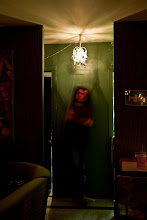In other words, perfect for blogging!!!
I say this because yet another recent article has piqued my interest. In this case, it is by infamous New York Press film critic Armond White. I say infamous because he is commonly known to have some, shall we say, unique takes on films. His summary of Joel Schumacher's tepid "Phone Booth" was "Colin Farrell, targeted by a sniper, suffers for our sins. Improper but important." Huh? And then in 2002, after including a Spielberg reference in literally every review that summer ( I was counting,) Mr. White rated "A.I." as one of the top ten films of all time. Like, up there with Citizen Kane and The Godfather.

Generally, any film Mr. White hates is one I (and many other people) will probably enjoy. There are exceptions of course. He gave a positive review to "No Country for Old Men" (as I did, with some reservations.) But he also said in the same review that the Coen Brother's best film so far has been "The Man Who Wasn't There." Again, huh?
Keeping this in mind, I was completely bewildered when I found myself nodding in agreement with Mr. White's article from last week's Press on the overpraise of film director Sidney Lumet. Now generally, I will not harp on this sort of thing (unless it's Vampire Weekend.) While I did not like Lumet's most recent film (also reviewed here,) I have enojoyed some of his past work, including "Dog Day Afternoon," "The Verdict" and "Q and A." But after netflixing Jane Fonda's 80's comeback thriller "The Morning After" (which Lumet directed,) I felt White was well within his bounds to take the director down a notch. Anyone who could helm such a travesty should be taken to task.

Now I know what you're thinking...Jane Fonda 80's comeback thriller, huh? Well besides the kitsch factor, I expected the man who directed the impenetrable "Network" to make a film with taut pacing, a tight plot/structure, good acting and Fonda in hot cougar mode. All I got was the Fondacougar.
After being set-up for a murder, Fonda aimlessly wanders around LA with Jeff Bridges for most of the film. They don't really look for clues or run from any baddies. The odd couple (she's a washed up alcoholic actress, he's a vaguely racist ex-cop) mostly just drive around, yell at each other and drink. In the last scene, a clue finally appears and the crime is solved. The casting of Fonda against type was promising and the Sunset Boulevard-esque subtext was very, uh, meta, but it was a miserable 96 minutes that didn't even have my desired 80's thriller sheen (as found in other flicks of the genre like Fatal Attraction, Black Rain, Year of the Dragon and Sea of Love.)

In addition to White's criticisms (which are more focused on Lumet's dubious rep as a quintessential New York City director) the problem with "The Morning After" and many of Lumet's films is his choice of scripts. When working with a solid writer like David Mamet (The Verdict) or Paddy Chayefsky (Network,) Lumet is a fine craftsman who handles the material with an unadorned efficiency that emphasizes emotional depth and intensity. But he seems to equally choose scripts with middling plotting and uninspired dialogue, perhaps because they contain the themes that he frequently explores (corruption, morality, the infrastructure of power.) In these instances, Lumet does little to edit the material or make stylistic decisions that can help the film. And the results ("The Morning After," "Famiy Business," "Guilty as Sin," "Before the Devil Knows You're Dead") are serviceable at best.
In general, I don't understand how seasoned directors like Lumet, Spielberg (War of the Worlds, anyone?) and Brian DePalma can be so inconsistent after decades of experience in the industry. Perhaps it's an unfair comparison, but I don't think Elvis Costello or Roy Haynes will put out a bad record at this point in their careers. It may not be a great record, but it will certainly not be "The Morning After."
